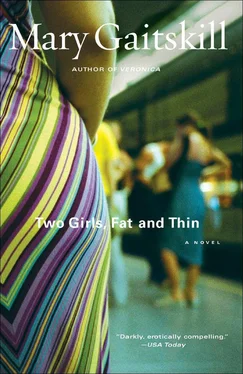Mary Gaitskill - Two Girls, Fat and Thin
Здесь есть возможность читать онлайн «Mary Gaitskill - Two Girls, Fat and Thin» весь текст электронной книги совершенно бесплатно (целиком полную версию без сокращений). В некоторых случаях можно слушать аудио, скачать через торрент в формате fb2 и присутствует краткое содержание. Год выпуска: 2012, Издательство: Simon & Schuster, Жанр: Современная проза, на английском языке. Описание произведения, (предисловие) а так же отзывы посетителей доступны на портале библиотеки ЛибКат.
- Название:Two Girls, Fat and Thin
- Автор:
- Издательство:Simon & Schuster
- Жанр:
- Год:2012
- ISBN:нет данных
- Рейтинг книги:5 / 5. Голосов: 1
-
Избранное:Добавить в избранное
- Отзывы:
-
Ваша оценка:
- 100
- 1
- 2
- 3
- 4
- 5
Two Girls, Fat and Thin: краткое содержание, описание и аннотация
Предлагаем к чтению аннотацию, описание, краткое содержание или предисловие (зависит от того, что написал сам автор книги «Two Girls, Fat and Thin»). Если вы не нашли необходимую информацию о книге — напишите в комментариях, мы постараемся отыскать её.
Review) create a haunting and unforgettable journey into the dark side of contemporary life and the deepest recesses of the soul.
Two Girls, Fat and Thin — читать онлайн бесплатно полную книгу (весь текст) целиком
Ниже представлен текст книги, разбитый по страницам. Система сохранения места последней прочитанной страницы, позволяет с удобством читать онлайн бесплатно книгу «Two Girls, Fat and Thin», без необходимости каждый раз заново искать на чём Вы остановились. Поставьте закладку, и сможете в любой момент перейти на страницу, на которой закончили чтение.
Интервал:
Закладка:
The most interesting moment of the day came in a conversation with the generally taciturn Mrs. Thomas. During the cardiogram, Mrs. Thomas said, “Dr. Winkgard is the best doctor I ever had. Because he’s not only a good doctor, he’s a good man. When I was on the operating table and that other doctor was saying they had to amputate my breast, I could hear Dr. Winkgard fighting for me. He said, ‘Don’t you take away that lady’s breast.’ And they didn’t. They did have to take a piece out of it”—she indicated the spot with her hand—“but they didn’t take the whole thing. And he was right. That was two years ago, and I’ve been okay since.”
Justine wholeheartedly agreed that Dr. Winkgard had done the right thing and left the room with a new respect for her employer. She was bewildered though that while he had been indifferent to Mrs. Rabinowitz who was beaten by her husband, he had respected Mrs. Thomas’s body and protected her breast. Well, Ron had made her a birthday cake and stayed up all night massaging her head; he had also assisted a demented woman in the rape of her daughter. And she, Justine, had said she didn’t blame him for doing it.
She returned home that evening with a severe headache. Her apartment seemed silent and void. She sat on the foam cushion before her low coffee table and ate a take-out salad from a plastic container. The air between her and the phone was thick and hostile. The bathroom seemed to be at the end of a treacherous tunnel even though it was only a yard or so from where she sat. Her stomach felt too tight even for chewed-up mouthfuls of salad, and she ate uncomfortably, forcing herself because it was good for her. She stared at the clothing she’d thrown on the floor that morning and decided that what had happened the night before hadn’t meant anything, that the blade lodged in her chest had always been there, that this incident had just reminded her of it. She adjusted her posture to accommodate the blade and went out for a walk.
The evening was cool and vague. Justine watched everyone who walked past her, and irksome tiny facts about them entered her orbit and clustered about her head. A young couple approached her, the man with his square pink head raised as if he were looking over a horizon, his hands thrust angrily in his pockets, his slightly turned-out feet hitting the ground with dismal solidity, his cheap jacket open to his cheap shirt. The woman on his arm crouched into him slightly, her artificially curled hair bounced around her prematurely lined face, her red mouth said, “Because it’s dishonest to me and to everybody and even to yourself.” Justine looked headlong into the open maw of their lives; they passed, and the pit closed up again. She looked into the windows of a restaurant and saw in the various wordless postures — a man with his body close in to the table at which he sat, his elbows supporting the intimate lunge of his torso; a woman holding herself in a reserved straight-backed position; a boy displaying himself with an aloof, cross-legged twist to one side as his grinning, socializing head held forth — varying gradations of human relationship that were so strange and unreadable to her, they made her feel like a lost dog. No one accosted or terrorized her.
The next day was a short day at the office; Justine left work at one o’clock. She went to Penn Station and boarded a commuter train to Princeton, New Jersey, to visit Rationalist Reaffirmation High. She had never taken a commuter train to the suburbs before, and the visit seemed like a special outing to her. She brought a bag of cashews, a bag of marzipan, and an apple and was looking forward to eating the treats.
She was startled by the appearance of the train; she expected anything associated with the suburbs to have a gloss of orderliness, cleanliness, and characterlessness, yet the train was a metaphor for decrepitude. Balled up potato chip bags, bottle caps, crumpled cigarette packages, and cans rolled on the floor or collected in corners under a gray gauze of dust. Foam poked out of the vinyl seat coverings. The cracked and taped-over windows had strange rattling collections of tiny paper wads, food crumbs, and unidentifiable granules in their loose-fitting casements. A businessman seated across from her put his briefcase down, pressed the recline button on his chair, leaned trustingly back, and fell into the lap of the man seated behind him.
Justine was more careful with her recline button, but there was nothing to worry about as it didn’t work. How, she wondered, could suburban people tolerate such a level of disrepair? She was disconcerted to find herself thinking that perhaps, since she’d been in New York, the entire country had deteriorated as seriously as Manhattan had, that everywhere people were wading ankle-deep in rolling, rotting trash, that everywhere homeless people pissed in the streets and railed at the well-to-do who slunk shame-faced along the walls. This of course was exactly what Anna Granite had said would happen, due to weak-willed liberals and governmental meddling. For a moment she looked at the possibility of total collapse as if she were a Definitist and found the idea to be somehow dramatically and ethically satisfying.
Then the train entered the fecund green landscape of Princeton, and she was stunned by the order and prosperity, the brightly painted homes, tended gardens, and lush lawns. Flawless sidewalks ran and touched noses, big round mail boxes stood like jolly street corner burghers. Justine had grown up thinking that such neighborhoods were normal places where most people lived, yet this neighborhood seemed foreign and mythic.
Max Nolte, a teacher at Rationalist Reaffirmation High, met her at the platform. He was a tall person with a big bottom and a little head and mild yet intent eyes. His open jean jacket exposed a full chest which, in its fleshy softness, suggested a sensitivity that was almost painfully swollen and tender and yet unrelievedly proud and out-thrusted, like the triumphant guitar chord of the crassest rock song.
He drove with one hand, gesturing with the other as he talked about the school and the English classes which he taught. “You go to most English classes today in the schools — have you? Well you should. Because you’d be shocked at what they teach. Joyce, Kafka — horrible stuff about people’s lives being destroyed by a baby crying. Or going to a carnival and getting lost and not being able to find what you wanna buy and getting depressed. Or a guy turning into a cockroach — it’s unbelievable. It’s all about defeat and helplessness. No wonder the kids hate it.”
Justine started to argue for the intrinsic value of beauty in writing, but as he continued, she found herself seduced by his blunt sensibility, so full of feeling yet so dumb, by his cheerful way of going after literature like a dog would a bone, snuffling, turning, chewing, genuinely enjoying it, provided it conformed to his belief. She thought he was a very nice person.
“What I teach is stuff like Ian Fleming, Mickey Spillane, Jack London, Hemingway, Conrad, and, of course, Anna Granite. Literature with clear plots, clear cause-and-effect connections, plenty of action and heroes . That’s the most important thing. Especially for kids at this age. Heroes who live by clear values.”
Justine remembered the man who had picked her up in the bar, his pale face, the eerie angle of his bones, his glittering eyes, the deliberate way he drew the smoking reed of cigarette to his lips. She remembered herself between his spread legs, sucking his cock, glimpsing his happy rat-toothed smirk with each upward bob of her pumping head. This memory, with its ugly eroticism, was not in the least arousing; however she recognized something compelling in it, a compulsion akin to that of a starving lab animal which will keep pressing the button that once supplied it with food, even though the button now jolts its poor small body with increasing doses of electric shock.
Читать дальшеИнтервал:
Закладка:
Похожие книги на «Two Girls, Fat and Thin»
Представляем Вашему вниманию похожие книги на «Two Girls, Fat and Thin» списком для выбора. Мы отобрали схожую по названию и смыслу литературу в надежде предоставить читателям больше вариантов отыскать новые, интересные, ещё непрочитанные произведения.
Обсуждение, отзывы о книге «Two Girls, Fat and Thin» и просто собственные мнения читателей. Оставьте ваши комментарии, напишите, что Вы думаете о произведении, его смысле или главных героях. Укажите что конкретно понравилось, а что нет, и почему Вы так считаете.












